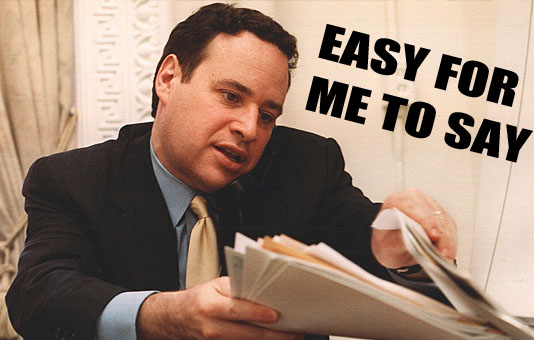How I'd Reduce Healthcare Costs

“Easy for Me to Say” is a FrumForum feature series in which David Frum answers reader questions about political issues. Readers are invited to pose questions that take the form of: “OK – so what would you do instead of this or that politician you’ve criticized?”
Questions should be e-mailed to editor [at] frumforum.com with “Easy for Me to Say” in the subject line.
Carl Asks: "OK...what would you do to reduce the share of the GDP taken by health care costs, to bring it closer to the 13% that Switzerland spends?"
I think the best, most effective, most responsive way to control health costs is to place greater power in the hands of health insurers.
That will strike many as completely counter-intuitive, but I think it's the best option, certainly much better than the other two leading candidates: direct government management of the health system or else asking patients to function as consumers.
As Uwe Reinhardt points out, the reason Americans spend more than any other nation on healthcare is not that Americans use more healthcare than people in other nations (they don't) - but that they spend more for the healthcare they buy.
The basic grammar of the American healthcare system is: sellers have market power, buyers don't. Insurers, the middlemen, are stronger than buyers but weaker than sellers. So they respond to seller demands by squeezing the buyers: feeding costs through, raising premiums and copays, seizing upon opportunities to withdraw coverage altogether from patients who get sick.
But what if we could build a different marketplace, where the middlemen had more power. Could we induce them to squeeze the sellers instead, forcing costs down through the system? I think we could, for example by:
1) Shifting the regulation of insurance from the states to the federal government. Right now, hospital corporations operate in a single unified national marketplace, while insurers operate under 50 different sets of rules. But it was a simple act of Congress that carved up the insurance market back in the 1940s, and that act of Congress can be reversed. If we had 5 or 6 big insurers operating in a single united marketplace, we'd tilt the balance of market power away from providers.
2) Instituting a more vigorous approach to regulation at the federal level. Once insurers get bigger and stronger, we need to break them of their current habit of relying on adverse selection to maximize profit. They have to be reoriented to a new mission: haggling with providers over prices. We need to unleash healthcare Sam Waltons on the health providers, armed with the power and infused with the mission of forcing prices down while holding the line on quality and service.
3) Generating and publicizing health outcomes quality data. The point is often made: we call it "healthcare" but what we pay for is "illness cures." Health insurers should be competing for the right to claim that their customers at every age enjoy the best health outcomes at the lowest price. Consumers need to see and know the truth of these claims: "75 year olds who sign up with ACME report greater satisfaction with their sex lives than people who sign with any other insurer." And we need a bonfire of all regulations and antitrust restrictions that impede insurers from discovering innovative ways to promote health. Health insurers might want to offer members free gym participation. They might want to offer frequent flyer points for members who lose weight. Their job should be to keep us alive and well as long as possible - by any innovative means they can discover.

